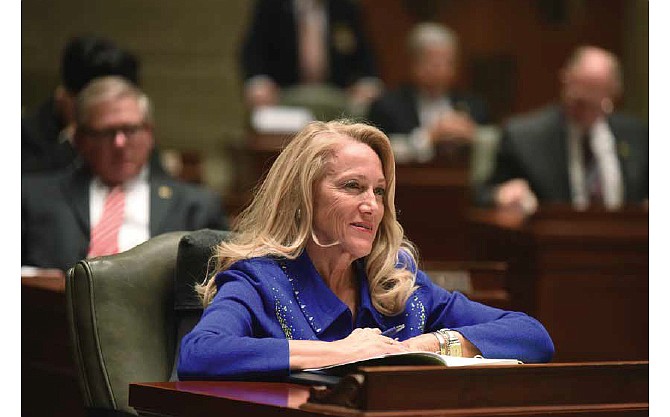JEFFERSON CITY, Mo. - If Missouri Sen. Jeanie Riddle's bi-partisan bill for the Missouri Civics Education Initiative passes, then high school students will have one more requirement to complete before graduation.
Senate Bill 638 would create the initiative, which would require high school seniors to pass a civics equivalency test similar to the naturalization test required for immigrants to become U.S. citizens.
"Hopefully it's a way we can engage the youth in the political system," Riddle said. "This test creates well-rounded individuals."
For students to pass the exam, they must answer at least 60 of 100 questions related to the naturalization test. They have an unlimited number of chances to take the test.
Riddle is leaving the decision-making up to school districts on how the exam is delivered; whether schools want to have students complete the test on school computers, taken as an oral or written exam is up to the districts and what they determine is necessary for their student needs.
Although the idea for the legislation came from her constituents, she didn't want to move forward with the bill without having taken a practice naturalization test. Riddle, who is a retired South Callaway teacher, only missed two on her practice exam and fully expects students to pass the minimum 60 percent requirement without too much difficulty.
The legislation won't change school curriculum, but Riddle thinks it makes sense to give students an incentive to know the material already being taught in Missouri school districts.
"The teachers are teaching the material, but we need to put the responsibility on the students to ensure retention," Riddle said.
And while she doesn't think the tests are challenging enough, the idea is to take "baby steps" with this legislation to create political interest in the younger generations. However, students with disabilities can receive a waiver from the test based on their Individual Education Program committee, which will determine a student's capability.
This is not the first year the bill has been introduced.
Riddle's copy of the bill and two other copies of the civics legislation were proposed last year. While the House bill only needed one vote, a series of filibusters prevented the Senate from passing bills during the last week of session.
The bill gained momentum last year with support across the state, and while the support continues to grow, Riddle has had to face some opposition.
"Opposition comes from not understanding what the bill is saying," she said. "But when I explain it people start to think it's a good idea."
"We're a citizen government," Riddle added. "Those of us in office eventually go home and back to our other jobs, and new people step up and take the position of being the voice. Our system works when citizens engage. If only a few people engage, then the results are skewed and whether someone thinks their voice doesn't matter, it's a system that has worked and we want to see it continue. I want students to engage, understand, be heard, know who's speaking on their behalf and be educated voters."

